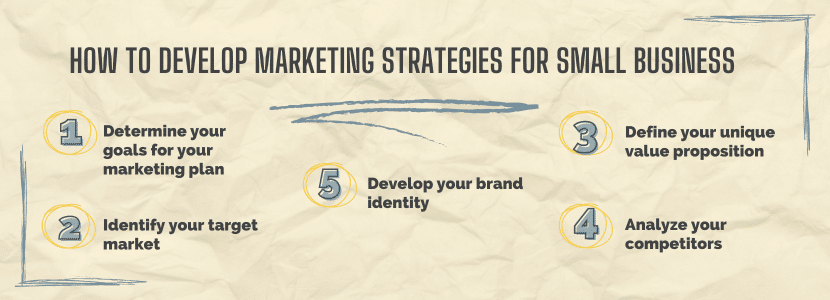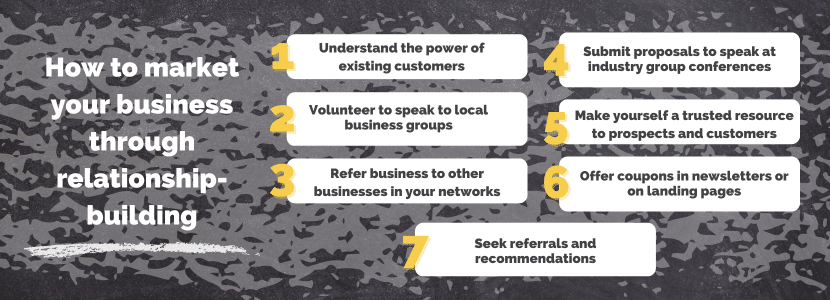All businesses, regardless of size, need to have a comprehensive marketing strategy in order to be successful.
Marketing strategies for small business are plans or approaches that a business or organization develops to promote its products or services and achieve its marketing goals and reach its target audience.
But marketing strategies for small businesses can be particularly challenging due to limited resources and budgets.
Despite this, they can still develop cost-effective yet powerful marketing strategies that can help them reach their target audience and achieve their goals.
With the right marketing strategy, you can target the right audience, identify your value proposition, develop an effective strategy, and measure your results. In this guide, we talk about steps and tools to help you create a successful marketing strategy for your small business.

Determine your goals for your marketing plan
To create an effective marketing strategy for your small business, you need to start by defining your marketing goals.
What do you hope to achieve with your marketing efforts? What sort of leads are you looking for? If you are a small business owner and you still do not quite have an answer to this, it will be difficult to devise a marketing plan for your business. (And, in that case, you should definitely consider brand marketing).
Your goals should be specific and measurable, with a timeline of when you can expect to achieve them. Once you’ve established your goals, it will be easier to determine the best marketing strategies, tools, and tactics that are best suited for achieving those goals.
Identify your target market
Understanding your target audience is essential to developing an effective marketing strategy for business. Who are your customers, as a small business? What are their needs, challenges, and pain points? What motivates them to buy your product or service? Who are the people most likely to purchase your product or service, and how can you target them with your marketing strategy?
Conduct market research and use customer feedback to build customer personas that represent your ideal customers. This will help you tailor your messaging, channels, and tactics to the specific needs and preferences of your target audience.
Define your unique value proposition
Your unique selling proposition (USP) is what sets your small business apart from your competitors.
It is the key benefit or advantage that your business offers to your customers that your other competitors do not have. Develop a clear and compelling USP that communicates your value proposition to your target audience. Differentiating yourself from other businesses is a key small business marketing strategy, so identify what sets you apart.
Also, consider how to make your value proposition as attractive and accessible as possible. This will help you differentiate your brand and stand out in a crowded market.
Analyze your competitors
In order to effectively differentiate yourself from your competitors, you must first understand what they are offering. Researching the services, products, and marketing strategies of your competitors will provide insight into what your competitors are doing well and what weaknesses you can exploit.
Develop your brand identity
Your brand identity is how your customers perceive your business. It is the combination of elements that communicates a message to your target audience. This includes everything from why you do what you do to your logo to the colors and fonts you choose, as well as to your social media presence and website design.
A strong brand identity will help you stand out in the market and help you further build trust with customers. Create a unique and memorable brand identity that reflects your USP and resonates with your target audience. Your brand identity should be consistent across all your marketing channels and communications.
Decide what tools you’ll use to measure marketing results
Once you have created a marketing plan, it is important to measure the results of the efforts of your small business marketing strategies. This will help you evaluate if your marketing initiatives are working and help you make adjustments if necessary.
To evaluate the success of your campaigns, you can use analytics tools like Google Analytics to track website visits, leads conversions, and other metrics relating to your digital marketing goals.
Surveys are also a great way for small business owners to get direct feedback from customers on their experience with your business or product.
For digital marketing campaigns, customer feedback can also be gathered through online reviews or social media feedback comments. Reviewing data regularly will help inform future marketing decisions and ensure that you are making the most of your marketing budget.
Implement content marketing strategies for small business
Content marketing is one of the most effective and cost-efficient marketing methods for small businesses to reach their target audience, build brand awareness, and establish themselves as an authority in their industry. Here are some tips for creating an effective content marketing strategy.
Create a website
Creating a website for your small business is an important step in making sure that you have control over your online presence and the ability to reach customers across different digital channels.
When choosing a website for your small business, start by selecting a domain name that best reflects your business and brand identity. Also, consider the type of content you will be creating, and choose a website hosting platform that can accommodate your requirements and any future growth.
Build your website with a CMS template
To continue with content marketing, it is important to build your website with a content management system (CMS) template. Content management system templates like WordPress, Wix, and Squarespace allow you to create and manage your website without needing too many technical skills or knowledge. You can choose from a variety of templates and customize them to fit your brand identity and digital marketing strategy.
Optimize your website for mobile
Your website should be visually appealing, easy to navigate on mobile devices, and fulfill all SEO best practices so that it is optimized for search engines. This will help your website rank higher in search results and increase your visibility to potential customers.
Optimize your content for search engines
To increase traffic on your business website, optimize your content to target specific keywords and phrases that potential customers are searching for on Bing and Google search engines.
To ensure your content ranks, follow all SEO best practices, such as using tags and meta descriptions to prompt users to visit your website when it appears on search engine results pages. Adding relevant images or videos can also increase user engagement with your content.
Develop an effective content strategy
A content strategy is an important part of any successful SEO plan. Marketing strategy for companies with digital content should include a mix of evergreen content and topical content that is updated regularly. Share quality content such as blogs, social media, videos, and more on your platform. Conduct thorough keyword research and use targeted keywords in your website’s copy to increase website traffic.
Boost your Google ranking with an SEO strategy
SEO (Search Engine Optimization) is a great way to get organic traffic to your website. Choosing and using effective keywords and optimizing your web pages can help you rank higher on search engine results pages, increasing the visibility of your content.
Start blogging for your business
Blogging is a great way to market your business. With blogs, you can establish your authority in your business niche and get more eyes on your website.
Additionally, by regularly updating and optimizing your content-based pages with keyword phrases relevant to the topic of the blog post, you can increase the chances of appearing higher in search engine results pages.
Plan an email marketing strategy
Email marketing is defined as using email to promote products or services. Like social media marketing, it is an effective way to reach your target audience and build relationships with them. Develop an email marketing strategy that includes newsletters, special offers, and other valuable content. To get the best out of your email marketing strategy, consider taking the following steps:
Build an email list and send informative mailings regularly to nurture leads
Start building your email list by first identifying your target audience. Knowing who you are trying to reach will allow you to tailor your email messages effectively and create engaging content. Once you have identified your audience, you can begin collecting emails from them. You can collect emails from existing customers, social media channels, online forms, events, or even website visitors who are willing to drop their emails for regular updates about your product.
Offer coupons In newsletters or on landing pages
To increase engagement with your email list, consider offering coupons for special discounts or exclusive offers. This is a great marketing strategy for new business. It is one of the best ways to encourage customers to open and interact with your emails. Make sure to include a clear call-to-action and link that drives recipients over to a landing page with a contact form to complete and more details about the offer so they can easily take advantage of it.
Offer incentives and discounts
To attract customers, you can also consider offering incentives and discounts for your product or service to encourage recipients to take action. This can be done through a limited-time offer or by promoting a special deal for subscribers only. By providing exclusive benefits to your email list, you can increase engagement and drive sales.
Add a personal touch to your marketing messages
For your email marketing strategy to be effective, it’s important to personalize your messages. Start by addressing your audience by name, and use their past purchase history or behavior to customize your content. This can be achieved through segmentation, where you divide your email list into smaller groups based on specific criteria such as location, interests, or buying habits.
This way, you can send targeted emails with relevant content that will resonate with each group.
Once you have built a sizable mailing list, start sending informative and appropriate mailings to it on a regular basis to nurture leads. This means sending out useful content such as white papers, case studies, relevant industry news, or helpful tips and tricks that your readers may find useful.
By doing this on a regular basis, you can use this marketing strategy to expand your customer base and further nurture relationships with your potential target customer.
Use videos as marketing tools
Videos can be effective marketing methods for small businesses. You can use videos for product demos, tutorials, and even how-to guides. Videos are also great at creating a more personal connection with potential customers and can help them learn more about your product in an engaging way. Once you have created your video, it’s easy to share it on social media, blogs, and websites to reach even more of your audience.
Engage with your audience on social media
Social media is one of the top marketing channels for small businesses. It is an excellent way for your small business to engage with your audience and build relationships. Choose the social media platforms that are most relevant to your target audience and use them to share your content and engage with your followers.
Use influencers to build brand awareness
Influencers can be a valuable asset when it comes to building brand awareness and reaching wider audiences. Look for influencers in your niche and consider partnering with them to promote your brand.
Try co-marketing
Co-marketing (also known as co-branding) is a marketing strategy in which two or more companies collaborate on a marketing campaign or project. The aim of co-marketing is to leverage the strengths of each company and increase brand awareness, reach, and sales.
For small businesses with limited resources, co-marketing can be an effective strategy to help boost visibility and sales with no additional costs. Small businesses can benefit greatly from co-marketing as a small business marketing strategy, especially when partnering with more successful influencers in their niche.
Market your business through relationship-building
Unlike big corporations, small businesses have one major advantage: they can build more meaningful relationships with their customers. Here is how to take advantage of this
Understand the power of existing customers
As a small business owner, it is very important to understand the power of existing customers. They are the ones who will form the core of your success and they are the most likely to talk positively about your business. Show them how much you value them by offering special discounts, attending events that they host, or even just taking out time to listen to their feedback. By simply being human, you can only retain your customer base, but find more target customers.
Volunteer to speak to local business groups
Take time to engage with your local community. Attend local events, sponsor a team, appear on local media, volunteer for a cause. Show your community that you care about their needs, and this will help create positive word-of-mouth amongst potential customers.
Refer business to other businesses in your networks
Building strong relationships with other local businesses that complement yours can help to create a larger network. It might sound counterintuitive, but sending customers to other businesses in your network can actually help your own business.
When customers have a good experience with one of your partners, they are more likely to come back to you for their future needs as well. The ole “you scratch mine, I’ll scratch yours” mentality is an important part of networking and building relationships.
Submit proposals to speak at industry group conferences
When you speak at conferences, you show potential customers that you are an expert in your field. This can help generate further interest in your business and open up additional opportunities to acquire new customers.
Make yourself a trusted resource to prospects and customers
One of the best ways to build trust with your customers is to position yourself as an expert in your field. This can be achieved by creating valuable content that helps your customers solve their problems or answer their questions. You can do this through blog posts, videos, podcasts, or social media posts. By providing this type of content, you’re demonstrating your expertise and building trust with your audience.
Offer coupons in newsletters or on landing pages
Another effective way to incentivize your customers to purchase from you is to offer coupons in your newsletters or on your landing pages. Not only do coupons help drive sales, but they can also encourage customers to share your brand with their friends and family. Just make sure the coupons are easy to use and have clear expiration dates.
Seek referrals and recommendations
Word of mouth is not a new marketing strategy. In fact, it is still one of the most powerful marketing tools available. Yet, all successful businesses still use it.
Encourage your happy customers to refer their friends and family to your business by offering referral marketing incentives like discounts or free products. You can also ask your customers to leave reviews or recommendations on your website or social media pages. This will not only help build your reputation as a trusted resource, but it will also help attract new customers to your business.
Leverage paid advertising platforms

Expanding your small business reach through paid advertising platforms such as Google Ads or Facebook Ads can be a great way to get more potential customers to see what your business has to offer.
Not only can these platforms provide access to a wide range of potential customers, but you can also target your ads to people who are more likely to be interested in what you’re offering.
You may also want to look into social media advertising and other promotional channels like email, video, and print marketing. These channels can help you effectively target new audiences and increase brand awareness.
Measure your results
Once you’ve set up your campaigns and started getting more potential ideal customers to see what your business has to offer, it’s important to measure the results of each campaign. Tools such as Google Analytics or A/B testing can help you track the performance of your campaigns and identify areas for improvement.
To ensure that you’re getting the most out of your marketing budget, it’s important to regularly assess and analyze your data. Doing this will help you make more informed decisions about where to invest in your campaigns and how to allocate resources for maximum impact.
Use Google Adwords
Google Adwords is a great tool for businesses to increase their reach and visibility. With it, you can manage and track your campaigns, select keywords that are relevant to your potential ideal customer, create targeted ads, and monitor the performance of each ad.
You can also use Google Adwords’ A/B testing feature to test different versions of an ad and determine which ones work best with your target audience. If you have multiple versions of an ad and want to see which one performs better, A/B testing can help you determine which one is more successful and how you can optimize it further.
Using Google Adwords will help you maximize the results of your campaigns and ensure that you’re getting the most out of every dollar spent.
Continuously measure your performance. Realize what is working and what needs improvement.
Do you need help creating a marketing campaign? Contact Take The Stairs, an experienced marketing strategist, today.
All small businesses need to have an effective marketing strategy to stay competitive and remain relevant in their industry.
Having a strategy allows for consistent and measurable progress, as well as the ability to adjust in order to meet changing customer and market needs. There is no one best marketing strategy, which is why it is important to develop a strategy that works for your business and meets its objectives.
Take for the Stairs is a digital marketing agency based in Nashville, Tennessee, that specializes in creating digital marketing campaigns for small- and medium-sized businesses.
[Contact us] today and see how effective marketing can take your business to the next level.













